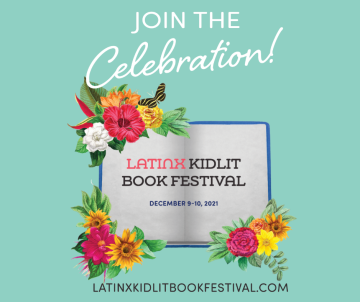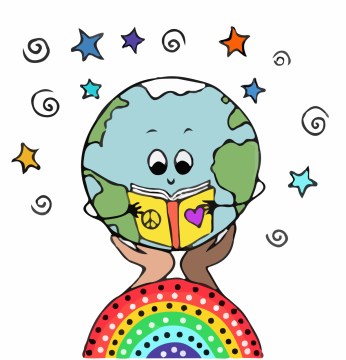
Artwork by Aixa Perez-Prado
Finding Our Places in the World
Do you have any troubling childhood experiences that have stuck with you? Ones that have taken up permanent residence in your adult psyche? Maybe things someone said or did that you have not been able to forget —no matter how hard you try. I’d like to tell you about some of my memories as a child immigrant, because they underscore the need for diverse middle grade books. When misrepresentation, or lack of representation, of an entire continent, it’s people and languages are part of a childhood story – how does that affect how children find their place in the world?
The In-Between Years
Fourth to seventh grade seem to be pivotal childhood years. Maybe it’s because kids are at that magical age of in-between. An age of transition that can be powerful and perilous, hilarious and horrible. A lot of the troubling expereinces I remember happened during my middle school years. And they all start with words.
“Go back to Mexico!”
This is something a friend said to me once. She was ‘joking’. So many of the words that stick were meant to be jokes, but felt more like little punches. I told her I’d never been to Mexico. “Then go back to Spain!” she countered.
I explained that I’d never been there either. Puerto Rico? I had also never been. Laughter ensued. Nobody could understand what I was. After all, I spoke Spanish so I must be from Mexico, Spain or Puerto Rico. But I’m from Argentina. That was a strange place to be from in Buffalo, N.Y. all those years ago. I suppose it’s different now, but back then that was weird. I was weird, and always struggling to fit in. Struggling to find myself in books, TV shows, movies — in the world I lived in. But no matter how hard I looked, I wasn’t there.
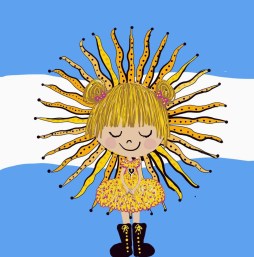
Soy Argentina @aixasdoodlesandbooks
“Why are you white?”
My classmate was looking in our social studies textbook. There was a picture of an indigenous South American child dressed in traditional gaucho costume in a rural setting. My experience of South America was nothing like this child’s experience, but he was the only representation of a person from my entire continent in our textbook. I explained that I was from the big city, Buenos Aires. I told my classmate that I had never even seen a gaucho, and that not everybody from South America looked like this child, dressed like this child, or had that kind of lifestyle. But my classmate persisted in wanting to know why I was white. I explained that my grandparents and great grandparents were mostly European.“Then you’re not really one of them,” my classmate declared, “or one of us.”
Words can be daggers sometimes. Because what does an in-between child want more than anything in the world? It is often to fit in somewhere, anywhere, to be like everyone else. Most children want to find connections with the protagonists of books, the characters in cartoons, the heroes of history. Some children never do.
“You’re not American.”
I can’t count how many times I’ve heard this, both inside and outside of school settings. In fact, I am American by birth, as is every South and Central American. We are from the Americas. It is true that those born in the US are most often referred to as ‘American,’ but that does not negate the fact that the rest of us also have claim to that label and all that it implies. We also come from a continent that was populated and thriving when colonization occurred. In many countries we also had slavery and the genocide of indigenous peoples. We also are culturally diverse mosaics made up of Native Americans, the descendants of enslaved peoples, descendants of immigrants from all over the world, and a mixture of all of those groups. We also hold the brutal, glorious and complicated history of what it means to be American. But the books I found as a child, and even as an adult, often didn’t reflect that.
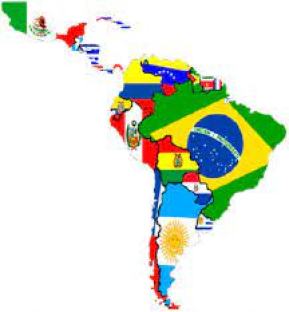 “Why does your mom talk like that?”
“Why does your mom talk like that?”
My mother had a heavy accent. She talked ‘like that’ because she learned English in her thirties. My mother was a physician who spoke fluent English but would never pass for a native speaker, and why should she? She had a full life before immigration. She had an established identity as an Argentinian professional woman. I am ashamed to say that I was ashamed of her accent when I was a kid. Every time I saw a character with an accent in a book, cartoon or movie, the accent was a source of ridicule or shame. Unfortunately, I internalised that message.
How can books help?
As a child immigrant, kidlit author/illustrator, professor of diversity studies and teacher education, I am convinced that the more books we have that represent linguistic and cultural minority communities in all of their varieties, the better. In Latin America and the Caribbean there are over thirty countries and dozens of languages spoken aside from Spanish and Portuguese. Latin Americans come in all skin tones, eye and hair colors, shapes, and sizes. Native/ Indigenous Latin Americans or Pueblos Originarios (Original Peoples as they are called in some countries) have rich histories, cultures, belief systems and a wealth of knowledge to explore. Luckily, more kidlit books are coming out from Latin American and Caribbean authors that challenge the stereotypes of what it means to be an American from south of the US border. Still, even more are needed. Below are a few books that I recommend (or that have been recommended to me) by Latinx and Caribbean authors that provide captivating, thoughtful, and fresh perspectives on all kinds of American stories.
Libros Recomendados – Recommended books
The following books contain a rich variety of experiences and adventures for kids in those in-between years who are also often in-between cultures. Most of these books feature immigrant children or children of immigrants from Latin America and the Caribbean and are written by authors who have the authenticity and background to represent those cultures in the diverse and complex way they deserve to be represented. Happy Reading!
Argentina
 Lobizona (YA) by Romina Garber – This book has so much to offer, experiences of the undocumented, conflicting feelings about identity and belonging, Argentine culture and werewolves!
Lobizona (YA) by Romina Garber – This book has so much to offer, experiences of the undocumented, conflicting feelings about identity and belonging, Argentine culture and werewolves!
“This layered novel blends languages and cultures to create a narrative that celebrates perseverance.” (Publishers Weekly, starred review)
(**new book by this author – Cazadora)
Chile
Niños: Poems for the Lost Children of Chile by Maria Jose Ferrada, translated by Lawrence Schimel, illustrated by Maria Elena Valdez. A book to be read and remembered, a tribute to children whose lives were lost by forces not of their own creation. Kirkus
Click on the image for more information from the publisher
Colombia
 What if a Fish (MG) by Anika Fajardo – This book takes place between the US and Colombia and centres around one child’s search for his own story of belonging with some magical realism thrown in.
What if a Fish (MG) by Anika Fajardo – This book takes place between the US and Colombia and centres around one child’s search for his own story of belonging with some magical realism thrown in.
Click on the link to read my interview with the author and on the book itself to to to the publisher’s page.
“Multilayered and convincing, the book will have readers rooting for its sweet and smart protagonist”. Kirkus
Cuba
 The Total Eclipse of Nestor Lopez (MG) by Adriana Cuevas “A charming and vibrant debut fantasy”. Kirkus.
The Total Eclipse of Nestor Lopez (MG) by Adriana Cuevas “A charming and vibrant debut fantasy”. Kirkus.
Click on the title link to see the MUF interview of the author and learn more about this book, and click on the image for info from the publisher.
(**new book by this author– Cuba in my Pocket – interview coming up in 2022)
Guatemala

The Other Half of Happy (MG) by Rebecca Balcarcel “At its core, Balcárcel’s novel is a story of identity within one’s self and within a broader community.” School Library Journal
This is a Pura Belpre Honor book. Click on the image for information from the publisher.
Haiti
 Haiti: The Year I Flew Away (MG) by Marie Arnold. “Pratchett like world building centres immigrant kids in a story filled with culture, humor and heart.” Kirkus.
Haiti: The Year I Flew Away (MG) by Marie Arnold. “Pratchett like world building centres immigrant kids in a story filled with culture, humor and heart.” Kirkus.
Click on the image for more information on this magical book from the publisher.
Mexico
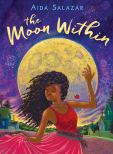 The Moon Within (MG) by Aida Salazar “A dazzling story told with the sensitivity, humor, and brilliant verse of debut talent Aida Salazar.” This is a novel in verse that explores multiple layers of identity as well as gender and heritage.
The Moon Within (MG) by Aida Salazar “A dazzling story told with the sensitivity, humor, and brilliant verse of debut talent Aida Salazar.” This is a novel in verse that explores multiple layers of identity as well as gender and heritage.
Click on the image for more information from the publisher.
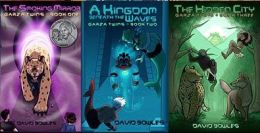 The Garza Twins series (MG) by David Bowles ““Bowles creates an action-packed story based on Aztec and Mayan mythology while capturing the realities of life in contemporary South Texas and Mexico.” –Pura Belpré Award Committee
The Garza Twins series (MG) by David Bowles ““Bowles creates an action-packed story based on Aztec and Mayan mythology while capturing the realities of life in contemporary South Texas and Mexico.” –Pura Belpré Award Committee
Click on the image for more information from the publisher.
Peru
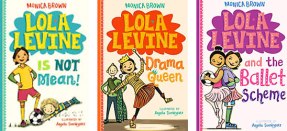 The Lola Levine series by Monica Brown “Celebrate a truly accepting multicultural character.” Kirkus
The Lola Levine series by Monica Brown “Celebrate a truly accepting multicultural character.” Kirkus
Click on the image for more information on this entire, fun, young MG series.
Latinx Kidlit Book Festival This Week!
And don’t forget to participate in the Latinx Kidlit Book Festival this week streaming on YouTube with interesting panels for teachers, and authors, and interactive activities for readers of all ages. See my blogpost with festival organisers for more information or click on the heading to go directly to the festival YouTube area.
